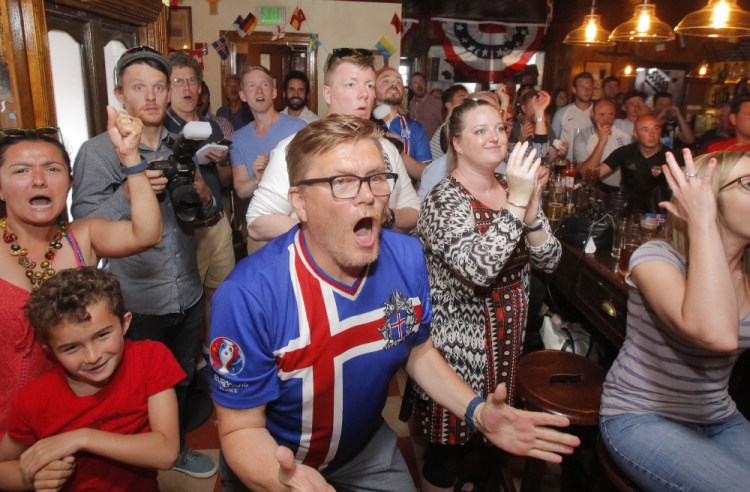If you were anywhere in the Old Port around quitting time Monday, surely you heard the roar that went up from the west side of Ri Ra, the waterfront watering hole where a crowd had gathered to watch a soccer match between underdog Iceland and mighty England.
The game, played on the French Riviera and televised by ESPN2, was a Round of 16 match in the European Championship tournament, more commonly known as Euro 2016, a quadrennial affair contested in the even years between World Cups.
Iceland came from behind to take a 2-1 lead over England at halftime, giving hope to many of the more than four dozen who had come to support the smallest country ever to field a team in a major international soccer tournament.
“We didn’t expect to get this far,” said Fridgeir Andri Sverrisson, 27, a graduate student from the University of Iceland who’s on a two-month stint at the University of Southern Maine’s Muskie School of Public Service.
“Anything beyond this is a treat.”
This kind of thing is old hat for England but new and exciting for Iceland. At about 327,000 people, the population of Iceland exceeds that of Cumberland County, but not by much, and is less than Cumberland and Waldo counties combined.
At a latitude equal to that of Alaska, Iceland also enjoys only three to four months of outdoor soccer.
“About 15 years ago we started putting a lot more money into soccer development, building good facilities to train year-round,” said Sverrisson, interrupted by a cheer-turned-groan of patrons seeing a spectacular bicycle kick by Ragnar Sigurdsson denied a goal only because the ball struck the surprised English goalie squarely in the chest.
“Oh, that would have been a cool goal,” Sverrisson said as he watched the replay. “That was crazy.”
Besides public funding for seven indoor facilities with artificial turf, the country also built more than 150 outdoor fields with underground heating and developed more than 600 elite coaches.
Sverrisson said his generation just missed out on the indoor stadiums. But, Iceland being Iceland, he is familiar with the national roster. Aron Gunnarsson, the bearded captain, attended the same high school as Sverrisson’s fiancee, and only a year apart.
“And I used to share an office (at the Icelandic Educational Testing Institute) with the mother of the goalkeeper,” he said. “That’s Iceland for you.”
An expanded Euro field of 24 teams helped Iceland qualify for the first time.
In group play, defensive-minded Iceland trailed in possession time at least two to one against Portugal, Hungary and Austria, yet still managed a 1-1 tie against both Portugal and Hungary, and pulled out a 2-1 stunner over Austria on a last-minute goal made famous by the Icelandic announcer’s borderline-hysterical call.
On Monday, similar enthusiasm built at Ri Ra as Iceland continually turned aside English forays.
“England has always been known for having prima donnas, players who do amazing and glorious things in the British Premier League but then when they play on the national team, nobody’s rowing in the same direction,” said Thordis Arnadottir, 48, an Icelander now in her 12th year living in Portland. “Getting into the competition was a big thing (for Iceland). Winning is a humongous thing.”
As the final minutes ticked off and it seemed increasingly likely that the score would remain 2-1, Petur Petersen swayed nervously, chewed on cuticles and ran his fingers through his short-cropped hair.
He had been in France for the games against Portugal and Austria.
When the game reached extra time, someone gave a Brexit! cheer to echo Great Britain’s recent vote to pull out of the European Union.
“This is desperate stuff for a nation on the verge of humiliation,” intoned the sober television announcer.
After one last corner kick failed to produce the equalizer for England, the game was over. Iceland had won. Jubilation reigned on the Portland waterfront.
In a voice hoarse from “Afram Island!” (Go Iceland) chants and exhortations to his countrymen on the screen, Petersen, a warehouse manager for the steamship company Eimskip, said he could think of only one comparable feeling.
“The birth of my daughters is all I’ve got,” he said. “But in sports? For Iceland? This is the biggest thing that has ever happened to the country.”
Next up for Iceland is the host country of France in a quarterfinal match scheduled for Sunday in Saint-Denis, a Parisien suburb.
Justin Levesque, 30, a Portland photographer who has been documenting Eimskip and Iceland’s entry into the Maine waterfront and economy for an exhibition to be mounted in a shipping container temporarily placed in Congress Square Park in October, wore the No. 8 jersey of Birkir Bjarnason and took plenty of pictures.
“I’m not a huge sports fan at all,” Levesque said, “but this has gotten me. I’m into it now. I have very good karmic feelings about how far we’re going to progress.”
Send questions/comments to the editors.




Success. Please wait for the page to reload. If the page does not reload within 5 seconds, please refresh the page.
Enter your email and password to access comments.
Hi, to comment on stories you must . This profile is in addition to your subscription and website login.
Already have a commenting profile? .
Invalid username/password.
Please check your email to confirm and complete your registration.
Only subscribers are eligible to post comments. Please subscribe or login first for digital access. Here’s why.
Use the form below to reset your password. When you've submitted your account email, we will send an email with a reset code.